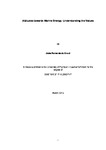Attitudes towards Marine Energy: Understanding the Values
| dc.contributor.supervisor | Bailey, Ian | |
| dc.contributor.author | de Groot, Jiska Reinarda | |
| dc.contributor.other | Faculty of Science and Engineering | en_US |
| dc.date.accessioned | 2015-07-28T12:51:32Z | |
| dc.date.available | 2015-07-28T12:51:32Z | |
| dc.date.issued | 2015 | |
| dc.date.issued | 2015 | |
| dc.identifier | 10373769 | en_US |
| dc.identifier.uri | http://hdl.handle.net/10026.1/3470 | |
| dc.description.abstract |
Marine Renewable Energy (MRE) in the form of wave, tidal and offshore wind has emerged as a potentially major component of strategies to reduce carbon dioxide emissions and combat climate change. One factor influencing the implementation of MRE technologies is acceptance by people living near developments. This study investigated (i) attitudes towards MRE in small island communities as likely host communities for MRE developments; (ii) the underlying factors and values shaping these attitudes; (iii) how communities viewed MRE with regard to their place attachments; (iv) the inclusion of communities attitudes into MRE decision-making; and (v) contributions to policy and practice of MRE development. Data were collected using a mixed-methods approach, employing questionnaire surveys and interviews in three case study communities: 1) the Orkney Islands in Scotland which have considerable experience with MRE; 2) the Shetland Islands, also a Scottish community but with somewhat less experience; and 3) the Isles of Scilly, an English community with limited MRE experience. These study sites provided an opportunity to examine attitudes towards MRE in areas with different levels of MRE experience and differing government administrations and consenting procedures, thus offering novel insights into how local contexts shape attitudes towards MRE. The theoretical position adopted was place attachment, and the study made steps towards understanding how place attachment processes operate when people evaluate MRE development locally. Processes of place attachment were found to be based on a continuous flow of interactions between people and places based on an evaluation of what happens in specific local contexts and how these are valued against sets of local priorities and preferences. The study found generally positive attitudes towards MRE, and identified local context, place-based values and the perceived effects of MRE as dominant in shaping support. The study thus found two important contributors that shaped attitudes: (i) local references and influences through which people observed issues, including socio-historical references, relational factors, and pragmatic factors, and (ii) local values, through which MRE was evaluated, which were established by residents based on evaluations of local characteristics, and how they related to strategies to maintain the long-term community continuity, and whether they were considered to be a threat, and therefore, a priority for continuity or for change. Based on these factors, a heuristic model was developed to visualise how attitudes towards MRE developed based on local contexts. Although complex interplays of local factors were observed, support for MRE development was largely based on its perceived local socio-economic benefits and perceptions of minimal environmental disruption. To incorporate local attitudes into decision-making, a place-based approach instead of a technology-based approach was advocated in which community priorities becomes the first focal point of siting processes. This approach is based both on the identified importance of local context for engaging the community and on ensuring appropriate siting based on engagement processes in which communities are appropriately represented and processes are tailored to local circumstances. An added important benefit from such an approach is that it allows for the inclusion of local knowledge and expertise in MRE siting. | en_US |
| dc.description.sponsorship | MERiFIC (INTERREG), Santander Seed-Core | en_US |
| dc.language.iso | en | en_US |
| dc.publisher | Plymouth University | en_US |
| dc.subject | Renewable Energy | |
| dc.subject | Marine Renewable Energy | en_US |
| dc.subject | Place Attachment | en_US |
| dc.subject | Stakeholder Engagement | en_US |
| dc.subject | Public Attitudes | en_US |
| dc.title | Attitudes towards Marine Energy: Understanding the Values | en_US |
| dc.type | Thesis | |
| plymouth.version | Edited version | en_US |
| dc.identifier.doi | http://dx.doi.org/10.24382/4157 |
Files in this item
This item appears in the following Collection(s)
-
01 Research Theses Main Collection
Research Theses Main


